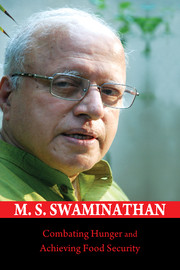Book contents
- Frontmatter
- Contents
- Foreword
- Preface
- Acknowledgements
- Abbreviations
- 1 Genesis and Growth of the Yield Revolution in Wheat
- 2 Our Agricultural Heritage
- 3 Shaping Our Agricultural Destiny
- 4 Thrust on Farm Revival
- 5 Nutri-farm Movement
- 6 Nutrition-sensitive Agriculture
- 7 Food Losses and Food Waste
- 8 Rice in Zero Hunger Challenge
- 9 Monsoon Management
- 10 Importance of Ecological Conservation
- 11 Caring for Ecology and Heritage
- 12 Conserving Biodiversity
- 13 Overcoming Hidden Hunger through Aquaculture
- 14 Biofuels – The Way to Go
- 15 Food Security
- 16 Vigilance for Sustainable Food Security
- 17 Food Security and Social Protection
- 18 Food Security and its Role
- 19 Sustaining the Livestock Revolution
- 20 Challenges in the Year of Science
- 21 Agriculture and Humanism
- 22 Fostering the Science of Science Communication
- 23 Olympic Move for Saving Children
- 24 Youth: The Agents of Change
- 25 Role of Women in Agricultural Production
- 26 Know-how to Do-how
- 27 From Bengal Famine to Right to Food
- 28 Financial Institutions and Fighting Food Inflation
- 29 Public Good Research in Agriculture
- 30 The Future of Indian Agriculture
- Bibliography
10 - Importance of Ecological Conservation
Published online by Cambridge University Press: 18 December 2015
- Frontmatter
- Contents
- Foreword
- Preface
- Acknowledgements
- Abbreviations
- 1 Genesis and Growth of the Yield Revolution in Wheat
- 2 Our Agricultural Heritage
- 3 Shaping Our Agricultural Destiny
- 4 Thrust on Farm Revival
- 5 Nutri-farm Movement
- 6 Nutrition-sensitive Agriculture
- 7 Food Losses and Food Waste
- 8 Rice in Zero Hunger Challenge
- 9 Monsoon Management
- 10 Importance of Ecological Conservation
- 11 Caring for Ecology and Heritage
- 12 Conserving Biodiversity
- 13 Overcoming Hidden Hunger through Aquaculture
- 14 Biofuels – The Way to Go
- 15 Food Security
- 16 Vigilance for Sustainable Food Security
- 17 Food Security and Social Protection
- 18 Food Security and its Role
- 19 Sustaining the Livestock Revolution
- 20 Challenges in the Year of Science
- 21 Agriculture and Humanism
- 22 Fostering the Science of Science Communication
- 23 Olympic Move for Saving Children
- 24 Youth: The Agents of Change
- 25 Role of Women in Agricultural Production
- 26 Know-how to Do-how
- 27 From Bengal Famine to Right to Food
- 28 Financial Institutions and Fighting Food Inflation
- 29 Public Good Research in Agriculture
- 30 The Future of Indian Agriculture
- Bibliography
Summary
Recently there has been controversy about the steps needed to save the Western Ghats ecosystem from further damage caused by development programmes. Both the greed of the rich and the needs of the poor are leading to soil and genetic erosion and to the disruption of hydrological cycles. Consequently, ecological and livelihood security are under threat. Human–wildlife conflicts are also growing in all parts of the country, with even peacocks being considered by farmers as threats to crop production in the Delhi area. India's population is likely to reach a level of 1.5 billion in another 20 to 25 years. How can we make development and ecological security mutually reinforcing and not antagonistic?
Delivering a lecture on ‘Agriculture in Spaceship Earth’ way back in 1973, I referred to the need for a ‘Do Ecology’ approach in our country to environment protection. I quote what I then said:
The environmental policy advocated in the richer nations is designed to protect the high standard of living — resulting from the unprecedented growth in the exploitation of natural resources during the last century — from serious damage by the very processes of such growth. It is of necessity a policy based on a series of DON'Ts. This is inevitable since the aim is to undo some of the damage already done or to prevent further damage along the same lines.
The poorer nations, however, are faced with the desire and need to produce more food and income from hungry soils, more jobs, more clothing and more housing. They are aware that historically a rising standard of living has depended on the ability of agriculture to release manpower to other more industrial pursuits. Hence they naturally wish to develop more industries and to find productive and remunerative employment for their growing population. For them, conditions of poverty and inadequate arrangements for human and other waste disposal may be greater causes of water and air pollution than the effluents from factories or fertiliser from the fields. Since the causes of pollution are by and large different, the solutions will have to be different too and it would be a grave mistake to attempt to copy the policies now being propagated in the developed world.
What we need is a culture of ‘Do Ecology’, i.e., meeting the needs of the current and future generations without ecological harm.
- Type
- Chapter
- Information
- Combating Hunger and Achieving Food Security , pp. 59 - 62Publisher: Cambridge University PressPrint publication year: 2016



